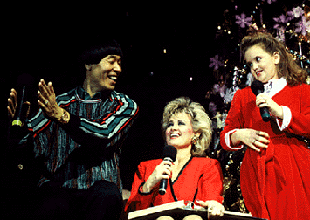GOLDSEA | ASIAMS.NET | ASIAN AMERICAN PERSONALITIES
KING OF BRANSON
PAGE 2 of 12
| Opening with some virtuoso fiddling, Tabuchi immediately sets to work wooing the audience. |
CONTINUED BELOW
At 6-1 Tabuchi is taller than expected. He has the kind of long,
square-shouldered frame that looks good in a dinner jacket. An hour before
the start of the 3 p.m. matinee, he is wearing a light green Polo oxford shirt
and cream-colored chinos. His striking bowl haircut makes his face look
round and boyish through he is well into his 40s. After shaking hands
Tabuchi becomes somewhat taciturn, though his face suggests friendly
interest. The dressing room's rich red velvet upholstery and ornate
wallpaper shows, once again, a woman's hand. The clutter of papers, books
and other paraphernelia and a TV set suggests that much of Tabuchi's life is
spent in it. Normally it's kept much neater, he tells me. Inside the open
closet hangs an assortment of glittering jackets, white shirts and black tuxedo
pants. One corner of the room is given over to Chinese lacquer panels inlaid
with jade and mother-of-pearl. They were quite expensive, Tabuchi says. He
picked them out from samples shown by the decorator. The dressing table
mirror is circuled by bulbs and laced with myriad notes of reminders,
including one that lists the numbers performed in the Christmas show and
another containing the lyrics to "We Wish You a Merry Christmas" with some
syllables underlined for emphasis.
Naturally, I am curious about Dorothy, the woman in whose sensibility I have
been steeped from the moment I stepped into the theater lobby. To my
questions about their meeting and courtship, Tabuchi's initial response is
evasion in the form of praise for Dorothy's beauty and talents as the theater's
production genius. Only his halting English keeps the praise from being
downright effusive. Not surprisingly for a musician, Tabuchi has learned
English by ear; he speaks by choosing stock phrases from a surprisingly rich
repertoire and leaving it to the listener mentally to supply the grammatical
connectors. Some interview subjects enjoy the chance to share trials and
tribulations, but Tabuchi is an intensely private man who is merely going
along, albeit courteously. He does take it seriously enough, however, to
ignore ringing phones and to dispatch summarily a knock on the door with an
order not to be disturbed again. Minutes before curtain time for the matinee,
Jewell comes to take me down to my seat. I am to resume the interview
after the show.

Tabuchi with his wife Dorothy and stepdaughter Christina.
Tabuchi doesn't figure in the show's opening numbers in which Tabuchi's troupe of three dozen renders in song and dance Christmas scenes from a waspy yesteryear that never was, complete with tree, elaborate gift boxes, fireplace and rockers. The most impressive things about the opening acts are the Broadway-quality sets and lighting. Otherwise, the numbers are reminiscent, in their impossible wholesomeness, of the Lawrence Welk Show. Not until a half hour into the show does Tabuchi and his violin make their entrance. Opening with some virtuoso fiddling, Tabuchi immediately sets to work wooing the audience. Despite his English, surprisingly limited for a U.S. resident of a quarter century, Tabuchi addresses the audience at every turn, even telling gentle jokes that poke fun at himself and at a friend and Branson competitor Mel Tillis.
"Folks, how 'bout put your hands together," Tabuchi says each time a member of his troupe completes a performance. His stock phrases are joined together with little more than genial smiles and conductorly dips of the forefinger. By the mid-show intermission the audience has accomodated itself to his speaking style. There are delightful moments when Tabuchi's strings of phrases somehow come together in conformity with grammatical conventions. It is marvelous to hear. PAGE 3
| PAGE 1 | 2 | 3 | 4 | 5 | 6 | 7 | 8 | 9 | 10 | 11 | 12 |
CONTACT US
|
ADVERTISING INFO
© 1996-2013 Asian Media Group Inc
No part of the contents of this site may be reproduced without prior written permission.
